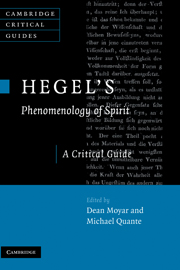Book contents
- Frontmatter
- Contents
- Notes on the contributors
- Preface
- List of abbreviations and citations
- Chapter 1 Substance, subject, system: the justification of science in Hegel's Phenomenology of Spirit
- Chapter 2 “Science of the phenomenology of spirit”: Hegel's program and its implementation
- Chapter 3 The Phenomenology of Spirit as a “transcendentalistic” argument for a monistic ontology
- Chapter 4 Sense-certainty and the “this-such”
- Chapter 5 From desire to recognition: Hegel's account of human sociality
- Chapter 6 “Reason … apprehended irrationally”: Hegel's critique of Observing Reason
- Chapter 7 What is a “shape of spirit”?
- Chapter 8 Ethical life, morality, and the role of spirit in the Phenomenology of Spirit
- Chapter 9 Self-completing alienation: Hegel's argument for transparent conditions of free agency
- Chapter 10 Practical reason and spirit in Hegel's Phenomenology of spirit
- Chapter 11 Religion and demythologization in Hegel's Phenomenology of Spirit
- Chapter 12 The “logic of experience” as “absolute knowledge” in Hegel's Phenomenology of Spirit
- Bibliography
- Index
Chapter 10 - Practical reason and spirit in Hegel's Phenomenology of spirit
Published online by Cambridge University Press: 22 September 2009
- Frontmatter
- Contents
- Notes on the contributors
- Preface
- List of abbreviations and citations
- Chapter 1 Substance, subject, system: the justification of science in Hegel's Phenomenology of Spirit
- Chapter 2 “Science of the phenomenology of spirit”: Hegel's program and its implementation
- Chapter 3 The Phenomenology of Spirit as a “transcendentalistic” argument for a monistic ontology
- Chapter 4 Sense-certainty and the “this-such”
- Chapter 5 From desire to recognition: Hegel's account of human sociality
- Chapter 6 “Reason … apprehended irrationally”: Hegel's critique of Observing Reason
- Chapter 7 What is a “shape of spirit”?
- Chapter 8 Ethical life, morality, and the role of spirit in the Phenomenology of Spirit
- Chapter 9 Self-completing alienation: Hegel's argument for transparent conditions of free agency
- Chapter 10 Practical reason and spirit in Hegel's Phenomenology of spirit
- Chapter 11 Religion and demythologization in Hegel's Phenomenology of Spirit
- Chapter 12 The “logic of experience” as “absolute knowledge” in Hegel's Phenomenology of Spirit
- Bibliography
- Index
Summary
THE CONCEPT OF SPIRIT AND ITS HISTORICAL ORIGIN
The characteristic concept which distinguishes Hegel from the rest of modern age philosophy is that of “spirit.” Modern philosophy since Descartes and Hobbes has been a philosophy of reason and subjectivity. Of course, there have been tendencies to radically criticize reason and subjectivity in modern philosophy as well: From Nietzsche to existentialism, critical theory in its early phase and the so-called “post-modern” philosophy. But in general “Reason” and “Rationality” are approved of as crucial and positive concepts and values in the science and philosophy, politics, and economics of modern times.
Hegel does not belong to the camp of the critics of reason. He even defends “understanding” (Verstand) against the philosophy, literature, and theology of immediacy, feeling, and faith. But understanding and reason are steps on a scale with reason on top. It is Hegel's message to the age of reason and enlightenment that reason must be transformed into spirit. It is the task of the Phenomenology of Spirit to prove that it is a fundamental misjudgment to take reason as the highest human faculty, the fundament of moral and legal action, and the goal of history.
The Phenomenology attributes the concept of spirit to the “modern age and its religion” (22, ¶25).
- Type
- Chapter
- Information
- Hegel's Phenomenology of SpiritA Critical Guide, pp. 173 - 191Publisher: Cambridge University PressPrint publication year: 2008
- 1
- Cited by



